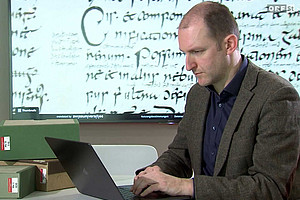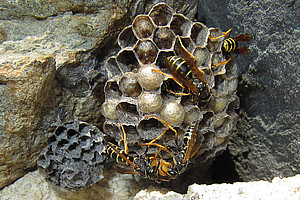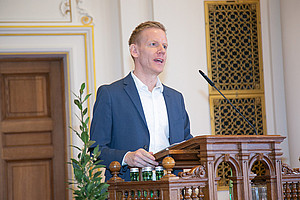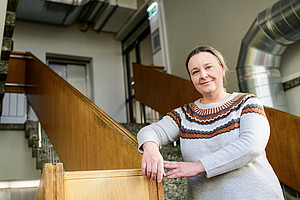Tourism is an important source of income for many countries. At the same time, however, it often contributes to the destruction of the environment as well as social and cultural structures. Leonard Röser, a graduate of Environmental Systems Sciences (USW), investigated in his master thesis how well known the concept of sustainable tourism is among young adults, and how it is practised. His sobering findings note that just two per cent of survey respondents from Austria and Germany could be called sustainability-oriented tourists. Röser, together with four other graduates, received the USW Award for his master thesis on 29 May 2019 at the University of Graz.
Leonard Röser’s study concentrated on environmental sustainability. This concept included mobility, food, and the consumption of power, water, and other resources. There were 660 respondents aged between 18 and 35 who took part in the online survey, providing Röser information about sustainable behaviours, both during holidays and in everyday life over the last twelve months. The subsequent comparison revealed a significant discrepancy: “Around 12 per cent of those surveyed said they were very environmentally friendly at home, while only two per cent said they were when travelling”, Röser summarises. In addition, “those who behaved most environmentally friendly in everyday life travelled the most”.
One of the study’s other findings is also interesting: “Less than a third of the respondents even knew what sustainable travel means. The overwhelming majority only related the concept to its environmental aspect, without considering the social and economic dimensions”, said Röser.
But what would sustainable travel actually look like? “In Europe, it is best to take the bus or the train and look for sustainable, certified accommodation, for example with the TourCert seal. The same applies at the holiday destination as at home: live in an environmentally friendly way, save energy and resources, avoid rubbish, buy regional food”, advises the USW graduate. When travelling to other continents, it is hardly possible to avoid flying. On these trips, economic, social and cultural aspects must be given greater consideration. “As for accommodation, local providers should be preferred over international hotels. Especially in the case of all-inclusive resorts the money does not stay in the region”, says Röser. He also takes a critical view of “selling out” the culture within the framework of folklore shows and the cultural adaptation of local structures to Western lifestyles. In general, he recommends that, before visiting a country, you inform yourself about its social and cultural norms in order to be able to respect them and – as a sign of consideration – learn at least a few words of the national language.
After Röser had realised in the course of his work that there is still a lot of need for information on sustainable tourism, he took the initiative to start up a project of his own – and is still looking for like-minded people. You can find more information on his website at camperswhocare.com.
General information
Nowadays environmental awareness increases. The attempt to solve complex problems, fails because of the onesided, linear view of the specialists. The study of environmental systems sciences has the purpose, to generate interdisciplinary teached academics, which are able to use the knowledge from more than just the own discipline, to consider problems as a whole and then handle and solve them.
Education
The individual diploma studies of environmental systems sciences at the Karl-Franzens-University of Graz exists since 1991. Due to the dedication of some students and professors these studies became regulary in october 2003. This education is, in an international relation, unique in his conception in europe. The basic idea of the studies of environmental systems sciences is, besides a grounding experts education, to connect the basics and the thinking of some other disciplines to establish connections between these. Thereby it is not only about the analysis of seperate systems elements, but also about the studies of systems dynamics and the crosslinking of these elements among each other. Thus are also systems analytical and mathematical methods a fundamental part of these studies. It is the aim, to enable the alumnis to yield in an interdisciplinary team on the one hand their experts competence and on the other hand the ability to connect diffent fields of knowledge.
The basic structure of these studies are therefore:
- The special study of the subject focus: business administration, chemistry, economics, geography or physics
- The enlargement on other fields of knowledge through the "restricted elective courses"
- The crosslinking of the disciplines in interdisciplinary and problem-oriented practical courses
- Basics in systems sciences, mathematics and statistics
- Work experience for four weeks with full employment in the bachelor's degree
- Free elective courses
The arrangement in the study environmental systems sciences with his various choices requires the initiative of the students. The studens participation is demanded particulary in the interdisciplinary practical courses: they have to organise it by themselves, and then later they plan the precise content together with the professors and in the end they put it into practise. The arrangement of this study in a bachelor's degree of six semesters (equal to three years) and a constructive master study of four semesters (equal to two years) allows a rapid degree as well as the collecting of work experience before the master study (one semester means four months during which coureses are held, two semesters are one year including holidays). The bachelor's degree covers 180 ECTS. The special study of the subject focus forms the main part of the bachelor's degree with 60 to 70 percent. In the master study there are just 50 to 60 percent of the total of 120 ECTS focused on the special study of the subject focus. Here they have more interdisciplinary education. The alumnis of environmental systems sciences are approved experts in their special study of the subject focus but they do also have an additional unique eduction. The apprenticeship contains courses from the subject focus, mathematics, systems sciences, ecological basics, two baccalaureate dissertations and one thesis, interdisciplinary practical courses and bounded elective courses (in these courses the students have the alternative to choose another two to three emphasises within their studies, in addition to their special study of the subject focus).
Profession
Environmental systems sciences have a large concern, to view beyond one´s own nose. They think systemic, are interested in other fields und especially in the interfaces between the different disciplines. They handle problems in interdisciplinary teams, which consist of persons from different focuses. Understanding and critical questions lead to solutions of complex problems. The alumnis of environmental systems sciences will find on the one hand a brought field of jobs and they are, on the other hand, able to define new jobs by their own. So there are a multiplicity of options for a job:
- an employment in the subject focus: business administration, chemistry, geography, physics or economics
- Cooperation in fields, where expert knowledge is paired with ecological understanding and/or ways of thinking that need systems sciences
- research and teaching in fields of sciences that are environmental and systemic oriented
- consulting as well as environment and systems management in companies
- consulting and supervision of organisations that protect our environment in communities, districts and countries
- leadership and cooperation in inspections of environmental tolerances and research projects
- concept, build-up, establishment, evaluation and interpretation of environmental observation systems
- planning and development of environmentally sound products and forms of production
- work in media and teaching in education and advanced training




